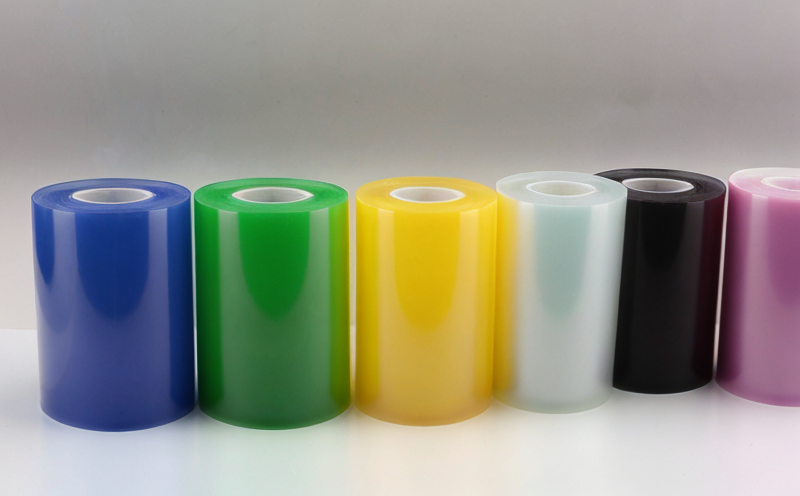ASTM D2126 Thermal Aging Resistance Testing of Plastic Films
The American Society for Testing and Materials (ASTM) D2126 Standard Practice establishes the procedure for conducting thermal aging resistance testing on plastic films. This service is crucial for ensuring that plastic films and sheets can withstand prolonged exposure to elevated temperatures without compromising their physical, mechanical, or chemical properties.
This test simulates real-world conditions where plastic films may be exposed to high temperatures during manufacturing, storage, or use in various industrial applications. The goal is to evaluate the thermal stability of polymer materials by exposing them to specified temperature and time conditions over a defined period. This helps quality managers and compliance officers ensure that products meet industry standards, thus maintaining product integrity and safety.
Thermal aging resistance testing is particularly important for plastic films used in packaging, automotive components, electronic devices, and construction materials. By understanding the effects of heat on these materials, engineers can optimize their formulations to enhance durability and performance. This service supports the development of safer, more reliable products that meet regulatory requirements.
The ASTM D2126 test protocol involves exposing plastic films to controlled temperature cycles in an oven for a specified duration. The specimens are then inspected for changes in appearance, texture, color, or mechanical properties such as tensile strength and elongation at break. The method is based on international standards that ensure consistency across different laboratories.
For accurate testing, the following factors need to be considered:
- Temperature control within ±2°C of the specified temperature range.
- Specimen conditioning and preparation according to ASTM guidelines.
- Use of appropriate environmental chambers for maintaining consistent conditions during aging.
The test results provide critical insights into how well plastic films perform under thermal stress, which is essential for product development and quality assurance. Compliance officers can use these data points to ensure that products comply with relevant regulatory standards, such as ISO or ASTM specifications.
| Parameter | Description |
|---|---|
| Temperature Range | 100°C to 260°C, depending on the material type. |
| Duration | Varies by material and application, typically ranging from a few hours to several days. |
| Acceptance Criteria | Description |
|---|---|
| Tensile Strength Retention | Maintaining at least 80% of the initial value after thermal aging. |
| Elongation at Break | Remaining within ±15% of the original measurement. |
Scope and Methodology
The ASTM D2126 thermal aging resistance testing method is designed to evaluate the long-term effects of temperature on plastic films. The scope includes a detailed examination of changes in physical properties such as tensile strength, elongation at break, and color stability.
To perform this test, we follow these steps:
- Specimen Preparation: Cut the film into standard-sized strips or sheets that will be used for testing.
- Conditioning: Allow the specimens to acclimate to room temperature and humidity conditions specified by ASTM D2126.
- Temperature Exposure: Place the conditioned specimens in an oven set at the specified temperature. Maintain this temperature for the duration required by the standard.
- Data Collection: After the exposure period, remove the specimens from the oven and allow them to cool down. Measure properties such as tensile strength, elongation at break, and color change using appropriate instruments.
- Evaluation: Compare the post-aging measurements with pre-aging values to determine compliance with acceptance criteria.
The method is validated by comparing results from multiple laboratories to ensure consistency. This ensures that the test data are reliable and can be used for regulatory submissions or internal quality control purposes.
| Key Considerations | Description |
|---|---|
| Environmental Chamber Control | Ensure precise temperature control to within ±2°C of the specified value. |
| Data Interpretation | Analyze changes in physical properties and color stability over time. |
Benefits
- Enhanced Product Reliability: Identify potential weaknesses early to improve product design and performance.
- Regulatory Compliance: Ensure adherence to international standards such as ASTM, ISO, and EN for quality assurance.
- Cost Savings: Avoid costly recalls or redesigns by addressing issues during development phases.
- Informed Decision-Making: Provide data-driven insights into material performance under thermal stress conditions.
- Improved Safety: Reduce the risk of product failures that could lead to accidents or injuries.
The results from ASTM D2126 testing are invaluable for quality managers, compliance officers, and R&D engineers. They help in optimizing material formulations, selecting appropriate manufacturing processes, and ensuring product safety and longevity.
Quality and Reliability Assurance
The ASTM D2126 thermal aging resistance testing service is part of our comprehensive quality assurance program. By incorporating this test into your development or compliance processes, you can ensure that plastic films meet the highest standards of reliability and performance.
We use state-of-the-art equipment and adhere to strict procedural guidelines to deliver accurate and consistent results. Our team of experienced professionals ensures that every step of the testing process is conducted with precision, ensuring the integrity of your test data.
For quality managers and compliance officers, this service provides critical information on how materials behave under thermal stress, which is essential for maintaining product safety and regulatory compliance. For R&D engineers, it offers valuable insights into material performance that can drive innovation and improvement.





